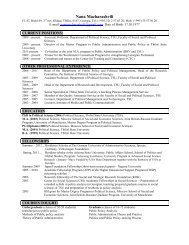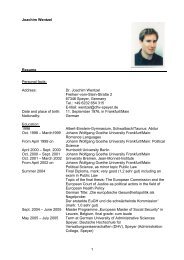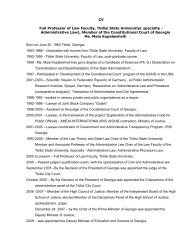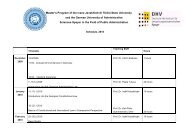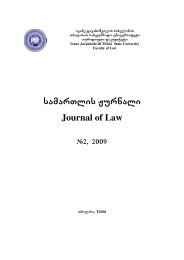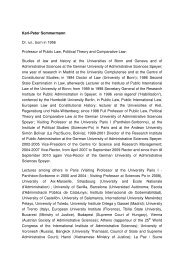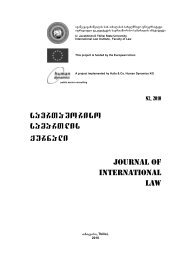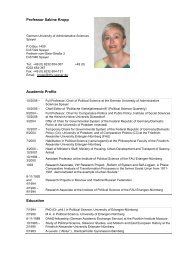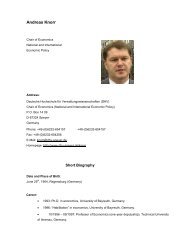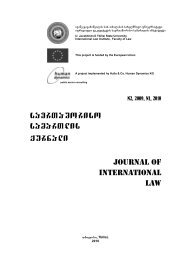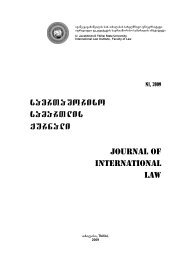Untitled
Untitled
Untitled
You also want an ePaper? Increase the reach of your titles
YUMPU automatically turns print PDFs into web optimized ePapers that Google loves.
STAGES OF DEVELOPMENT OF SCIENTIFIC CONCEPTS<br />
ON CORRELATION BETWEEN INTERNATIONAL<br />
AND DOMESTIC LAW AND CONTEMPORARY EVENTS<br />
IRINE KURDADZE<br />
The issue of the correlation of between<br />
International and domestic law is one of the<br />
most complex problems of current importance<br />
in the doctrin of international law.<br />
The growing integration processes in the<br />
contemporary world brought about the rapprochement<br />
of international and national law<br />
in the last decade. This is indicated also by<br />
the fact that international law does not only<br />
represent the tool for international relations<br />
of states (as this used to be in the past), but<br />
has also turned into the domestic regulation<br />
mechanism. The universalisation of economic,<br />
transport and information links, the intensification<br />
of the global ecological problems,<br />
mass character of migration, and what is most<br />
important, the necessity of keeping under the<br />
control the matters related to the protection<br />
of peace and security, the production of the<br />
mass destruction weapons, the fight against<br />
international terrorism, etc. created a strong<br />
objective basis for strengthening this trend.<br />
The new world order requires on the one hand<br />
bringing national decisions closer and on the<br />
other hand making common decisions by the<br />
international community.<br />
A number of challenging questions<br />
emerge, which call for political and legal solution:<br />
how shall the state sovereign rights be<br />
correlated with the authority of international<br />
organizations Is it acceptable to limit the first<br />
How shall the interests of parties be protected<br />
on an equal footing To what extent can<br />
international norms and mechanisms serving<br />
this purpose be used<br />
At the current stage, when the international<br />
law is attributed such a great importance,<br />
in the case of clash of the norms of international<br />
and domestic law the question, as to<br />
which shall be given a priority, is increasingly<br />
becoming an issue of deliberation of the inernational<br />
courts. The case law, on its turn, in<br />
the theory of international law causes the problem<br />
of correlation of international and national<br />
law.<br />
In the past the international law researchers<br />
didnot conside the problem of correlation<br />
separately, as the latter did not have a significant<br />
practical importance.<br />
Starting from the 19 th century the two directions<br />
have been formed in international law<br />
in relation with the issue of correlation: the<br />
dualistic and monistic. The concept of the dualistic<br />
theory was based on the following thesis<br />
– international and domestic law are two<br />
separate legal systems and therefore, primacy<br />
of any of those over the other is excluded.<br />
The dualistic theory as a result of influence<br />
of the positivism emergea, which dominated<br />
in XIX-XX centuries. As it is well known,<br />
the positivism school rejected the significance<br />
of the natural law and considered the law as<br />
the rule of behavior established and provided<br />
for by state power. Only those rules of behavior<br />
formulated by the mutual explicit (treaty)<br />
or implicit (custom) agreements of states were<br />
recognized to be rules of international law. The<br />
positivism was trying to strengthen the practice<br />
of the bourgeois states, protect their sovereignty<br />
and independence. At that stage the<br />
international law encompassed relatively limited<br />
number of domestic issues of states. The<br />
international and national law contradicted<br />
each other mainly in diplomatic and sale issues,<br />
the rights of foreigners, the regime of<br />
sailing. The trends of free trade were perceptible<br />
in international politics. Later on the<br />
boosting of international bonds resulted in the<br />
widening of the circle of matters to be regulated<br />
by international and national law.<br />
The German lawyer Triepel in his work<br />
“International Law and National Law”, pub-<br />
21



